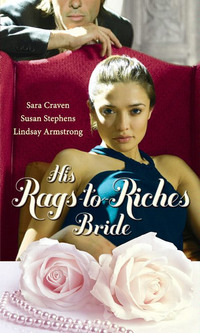
Полная версия
The Token Wife

Her voice shook. “Alex—please. Don’t do this….”
“Do what?” he questioned. “This?” He stroked her hair aside and kissed her nape. “Or this?” He bent his head and pressed his lips to Louise’s bare shoulder, forcing a shiver of response from her.
“Because I hear what you’re saying, my reluctant wife,” he told her softly. “But all evening I’ve seen your eyes. Felt the way you’ve touched me—how you went into my arms. And you know it’s true…”
Legally wed,
But he’s never said…
“I love you.”
They’re…

The series where marriages are made in haste…and love comes later….
Look out for the next book in the Wedlocked! miniseries
Coming soon:
The Constantin Marriage by Lindsay Armstrong Harlequin Presents #2384
Alex Constantin had agreed to a marriage of convenience with Tatiana Beaufort—but she surprised him on their wedding night by asking for a year’s grace before making theirs a “real” marriage. A year later Tattie is both alarmed and tempted when her enigmatic husband suggests they become lovers at last….
The Token Wife
Sara Craven


CONTENTS
PROLOGUE
CHAPTER ONE
CHAPTER TWO
CHAPTER THREE
CHAPTER FOUR
CHAPTER FIVE
CHAPTER SIX
CHAPTER SEVEN
CHAPTER EIGHT
CHAPTER NINE
CHAPTER TEN
CHAPTER ELEVEN
Endpage
PROLOGUE
WHEN Alex Fabian was displeased, his annoyance invariably radiated from him like static electricity, alerting the wary to keep their distance.
Tonight, entering his grandmother’s Holland Park house, he was crackling like an approaching storm, although he managed a brief smile for the elderly manservant who admitted him, and who’d known him since childhood.
‘Barney—you’re well? And Mrs Barnes?’
‘Both fighting fit, thank you, Mr Alex.’ Barnes paused. ‘Her ladyship hasn’t come downstairs yet, but you’ll find Mr Fabian in the drawing room.’
‘My father?’ Alex’s brows snapped together. ‘I thought they weren’t speaking to each other.’
‘There has been a rapprochement, sir.’ Barnes’ tone was sedate. ‘Last week.’
‘I see.’ Alex shrugged off his overcoat, and cast a fleeting but critical glance at his reflection in the big gilt-framed mirror before crossing the wide hall to the double doors which led into the drawing room.
He supposed he should have fitted in a visit to the barber, he thought, raking an irritable hand through the tawny hair which brushed his collar.
But the charcoal suit he was wearing, set off by a silk waistcoat in a paler shade of grey, the pristine white shirt, and discreetly striped tie acknowledged that this was a formal visit.
That he’d been sent for.
And his tight-lipped expression and smouldering green eyes indicated that he suspected what was behind the summons.
He found George Fabian seated on one of the sofas that flanked the fireplace, glancing through a newspaper.
He said, without looking up, ‘Good evening, Alex. We have been instructed to help ourselves to a drink.’
‘Thank you, sir, but it’s a little early for me.’ Alex glanced pointedly at his watch. ‘I wasn’t sure whether I was being invited for dinner, or nursery tea.’
‘I suggest you ask your grandmother that,’ his father advised curtly. ‘This little family gathering was her idea, not mine.’
‘And its purpose?’ Alex walked to the hearth and gave the logs that burned there an impatient kick with a well-shod foot.
‘I understand to discuss the arrangements for her birthday party.’ George Fabian paused. ‘Among other things.’
‘Indeed?’ Alex’s brows rose sardonically. ‘And am I permitted to speculate what those “other things” might be?’
His father gave him a dry look. ‘I imagine your position as chairman in waiting at Perrins Bank might come up for discussion.’
There was a silence, then Alex said, with a touch of hauteur, ‘Are you implying that it could be in some doubt? I wasn’t aware that my ability to run the bank was being called into question.’
‘It isn’t, as far as I know.’ George Fabian folded the paper, and tossed it aside. ‘It’s more a matter of image.’ He pursed his lips meditatively. ‘Too many pictures in the wrong sort of paper. Too many pieces in the gossip columns. And too many girls,’ he added flatly.
‘I wasn’t aware that I required a vow of celibacy to work at Perrins.’ Alex kept his tone light, but his fingers beat a restless tattoo on the edge of the mantelpiece. The fact that he’d been expecting this made it no less unwelcome, he thought, his edginess increasing.
‘Then think again,’ his father said brusquely. ‘Perrins is an old-fashioned bank, run by conservative people, and they don’t like the kind of adverse publicity you’ve been attracting.’
He shook his head. ‘The customers want to know that there’s someone solid and reliable at the top, whom they can trust. Not a playboy.’ He paused. ‘You’re a high-flyer, Alex, but you’re getting perilously close to the sun. Take care you don’t come crashing down.’
‘Thank you,’ Alex said with dangerous politeness. ‘Have you been asked to pass on these words of wisdom, or was it all your own work?’
George Fabian sighed wearily. ‘Don’t be so damned prickly, boy. I’m your father, so I think I have the right to be concerned. I don’t want to see you throw away the potential for a brilliant career.’
‘If the worst happens, there are other banks besides Perrins,’ Alex said tautly.
‘Indeed there are,’ his father agreed. He gave the younger man a long, steady look. ‘Unless, of course, you become too hot for any of them to handle.’
There was a silence, then Alex said quietly, ‘Maybe I will have that drink after all.’ He went over to the side-table, where decanters and glasses were set out, pouring himself a single malt whisky. ‘So.’ He turned back, glass in hand, his expression challenging. ‘What’s the rumour on the piazza?’
‘This and that.’ Mr Fabian paused. ‘I gather Peter Crosby is going to be promoted in the next government reshuffle,’ he added almost inconsequentially.
Alex stiffened. ‘And?’
‘And that means he’ll become of increasing interest to the tabloids.’
George Fabian drank some of his own whisky. ‘I gather the Daily Mercury is already on red alert. And that a news team has been detailed to keep a close eye on his wife.’
There was another, longer silence. Then, ‘I see,’ said Alex, his voice expressionless.
‘In addition,’ Mr Fabian went on, ‘there’s an unconfirmed report that Crosby has consulted a lawyer, and is considering hiring a private detective to follow Mrs Crosby, and monitor her calls.
‘There are no children, of course, and he may be preparing to dump the beautiful Lucinda before she jeopardises his triumphant march to power by some further indiscretion. You’re not the first, you know.’
‘I am aware of that.’ Alex’s look and tone were icy.
‘And it’s by no means certain he would go for a simple, no-fault divorce. He has the reputation of being a vindictive bastard.’ He gave his son another steady look. ‘He could decide to name and shame.’
‘It’s a pity the bloody gossip-mongers haven’t something better to do.’ Alex threw the whisky down his throat with a jerky movement.
‘They have their uses,’ his father returned placidly. ‘Perhaps you should be grateful to them. Featuring in a messy, high-profile divorce is something that the Perrins board would never stand for in their chairman.’
Alex’s smile glittered. ‘Gratitude is not my overriding emotion at the moment.’
George Fabian looked concerned. ‘I hope you’re not going to tell me that Lucinda Crosby is the love of your life.’
‘Certainly not.’ His son gave a cynical shrug. ‘I doubt if such a creature exists.’ He’d been thoroughly enjoying his liaison with Cindy Crosby who was not only beautiful but also sexually voracious, he thought with an inward grimace. But he’d been planning to end it anyway, married women not being entirely to his taste.
He gave his father a stony look. ‘I hope that reassures you.’
‘Don’t congratulate yourself too soon,’ Mr Fabian cautioned. ‘You’re not out of the woods yet.’ He paused. ‘Have you ever heard your grandmother talk about a cousin of hers who went off to South Africa just before the war—Archie Maidstone?’
Alex frowned. ‘Yes, she’s mentioned him. I got the impression she’d been very fond of him at one time, and then he got himself into some kind of trouble, and had to be shunted out of the country.’
‘That’s the one.’ George Fabian nodded. ‘He had a job with Perrins, and embezzled some money. The family closed ranks and made good the loss, apparently, but he was warned never to come back to England.’
‘And has he?’ Alex gave a faint whistle. ‘He must be a hell of an age.’
‘Actually, he’s dead,’ said Mr Fabian. ‘But his grandson isn’t, and he’s been over here visiting. Building bridges. Seems to have made an excellent impression on your grandmother, too.’ He paused. ‘He even got her to invite him down to Rosshampton for the weekend.’
Alex’s attention was suddenly, sharply focused. ‘Go on.’
‘He’s married,’ said George Fabian. ‘And she’s asked him to come back for her birthday, and bring his wife so that he can show her Rosshampton too.’
Alex went on staring at him. ‘Meaning?’
‘Just that your inheritance may not be as secure as you thought,’ his father said bluntly. ‘There’s an alternative claimant.’
‘I’m her only grandson,’ Alex said. ‘What is this guy —a second…third cousin? And she’s always said that Rosshampton will ultimately come to me. You really think that’s in doubt?’
‘I don’t know,’ George Fabian admitted. ‘But she’s very taken with him—and the fact that he’s married…stable. She likes that—and she may have been drawing a few unfavourable comparisons.’
Alex’s mouth had firmed into a steely straight line. ‘I see.’ He glanced up at the picture on the wall above him, a water-colour that he had commissioned for Lady Perrin’s eightieth birthday. He saw the elegant grey stone house sheltering among the ancient trees; the sunlight falling in swathes across the sweeping lawns, and, in the distance, the gleam of water.
He thought, with a pang, of how many of the happiest weeks of his childhood had been spent there. How, over the years, it unerringly drew him back to its rock-like security. How it had always seemed enshrined in his heart, timeless and unchanging, waiting for him to become its master.
And his grandmother had encouraged that, he thought with a pang of disquiet. Had deliberately fostered his love for the house, and let him think that it would one day be his.
And now, for the first time, there was a doubt in his mind. A shadow in the sunlight that disturbed him perhaps more than any of the other unpalatable things that had been said to him tonight.
This unknown South African, he thought, his hand tightening round his empty glass. This grandson of a man who’d been sent away in disgrace, but for whom Selina Perrin might cherish tender memories. This man was going to steal Rosshampton from him? Over his dead body!
Then the door opened, and Lady Perrin came in. She was wearing one of the elegant long black dresses she favoured for the evening, and her snowy hair was piled on top of her head in an imperious knot.
Alex saw that she was using the silver-topped cane she usually despised as a sign of weakness, and realised that she must be in real pain from her arthritis to give way like that. The anger and unease within him was replaced by a swift compassion he dared not show.
His father received a brief inclination of the head, and, ‘Good evening, George.’
Then she was turning to himself, the fierce eyes beneath their arched brows sweeping him from head to foot, the carefully painted mouth stretching in a wintry smile.
‘My dear Alexander. Quite a stranger.’
Alex took her hand, and kissed the scented cheek. ‘Never to you, Gran dear.’
‘Hmm.’ Selina Perrin made her way to the other sofa, and sat with an effort, accepting the dry sherry that Alex brought her with a word of thanks. ‘Now, come and sit with me, and tell me everything you’ve been doing—apart from what I read about in the papers, of course. There’s quite enough of that.’
‘Ah,’ Alex said lightly. ‘You should never believe all the papers say. But I’ve always thought that if you work hard, you should be allowed to play hard too.’
‘I have no objection to that,’ she said. ‘Just to your occasional choice of playmate. And don’t glare at your father,’ she added calmly. ‘He didn’t tell me about the Crosby woman. I already knew.’
Alex bit his lip. ‘What a pity you never worked for MI5, darling.’
‘There weren’t the same openings for women in my day.’ She paused. ‘Isn’t it time, Alexander, that you left other men’s wives alone, and found a decent, respectable girl of your own? Settled down?’
He’d expected a sly ambush over dinner, not this frontal attack, and had to make a swift recovery.
‘How dull you make it sound, Gran,’ he said lightly. ‘Besides, I’d be the last man on earth a girl like that would want to marry.’
‘Specious nonsense,’ Lady Perrin said contemptuously. ‘And you know it. You’re doing the family no credit, Alexander, and it has to stop. And I refuse to allow the bank to be affected by your rackety behaviour. You’re—what? Thirty-three?’
‘Thirty-two,’ he said, instantly cross with himself for rising to the bait.
‘Precisely. You should have sown your wild oats by now.’
He was seething inwardly. ‘Perhaps you’d like to suggest a suitable candidate?’
‘I could suggest dozens,’ his grandmother said calmly. ‘But I certainly wouldn’t jeopardise their chances by naming them.’
In spite of himself, he found his lips twitching. ‘Gran, you’re impossible.’
‘I’m also serious,’ Lady Perrin returned implacably. ‘It’s my birthday in three months’ time. I shall expect you to attend it with your bride.’
Alex was shaken to the roots. From the opposite sofa, he could see his father staring at them both in open incredulity.
He said quietly, ‘Darling, that’s quite impossible. You must see that. How could I possibly meet someone…persuade her to marry me in that sort of time frame?’
‘You are wealthy, clearly attractive to women, and blessed with far more charm than you deserve.’ Selina Perrin’s tone was resolute. ‘It should be entirely within your capabilities.’ She paused. ‘I would not wish to be disappointed.’
The warning was there—implicit—staring him in the face.
He said, with a touch of desperation, ‘Grandmother…’
‘Besides,’ she went on, as if he had not spoken, ‘Rosshampton is a family house—a home waiting to be occupied. I must warn you, Alexander, that I should not wish it to become a bachelor pad. Or, indeed, permit that to happen. Do I make myself clear?’
Alex stared at her, the colour draining from his face, the blood drumming in his ears.
He said hoarsely, ‘Clear as crystal.’ And saw her give a brief, satisfied smile.
Reaching for her cane, she rose purposefully to her feet. ‘Then let us go into dinner. I hope you’re both hungry.’
He couldn’t speak for his father, Alex thought grimly as he followed her to the door, but his own appetite had been killed stone dead.
He’d come prepared for disapproval, and instead been presented with an ultimatum.
But he wasn’t going to let Rosshampton go without a struggle, he told himself. And, although she was infuriating, he did love his grandmother.
If his inheritance depended on him finding a girl to marry in the next three months, then a wife he would have.
But a wife on my own terms, he thought as he took his place at the dining table. Not yours—my dear, clever Gran. And we’ll see, shall we, who has the last laugh?
CHAPTER ONE
‘LOUISE—are you up there? What on earth are you doing?’
Louise Trentham, on her knees in the loft, surrounded by open trunks full of elderly clothing, heard her stepmother’s querulous tones from the landing below, and grimaced faintly.
‘I’m looking for thirties evening dresses,’ she called back. ‘For the Village Players.’
‘Well, come down, please,’ Marian Trentham said sharply. ‘I can’t conduct a conversation peering up into a hole.’
Lou sighed inwardly, but made her way over to the hatch, and swung slim, denim-clad legs onto the loft ladder.
‘Is something wrong?’ she enquired as she made her way down. ‘I made up the rooms as you told me, and did the flowers. And all the food is in the refrigerator, ready for Mrs Gladwin.’
‘That’s the trouble,’ Mrs Trentham said crossly. ‘She’s just telephoned to say her eldest child is ill again, and she won’t be able to cook dinner tonight. And she knows how important this evening is.’
Lou reflected drily that there probably wasn’t a soul in the known universe who wasn’t aware that Alex Fabian was coming for the weekend. And why.
She said, ‘It’s hardly her fault. Tim can’t help being asthmatic.’ She paused. ‘Why don’t you have dinner at the Royal Oak instead?’
‘At a public house?’ Mrs Trentham reared back as if her stepdaughter had suggested a visit to a burger joint.
‘A very upmarket one,’ Lou pointed out. ‘With a restaurant in all the food guides. In fact, you’ll be lucky to get a table.’
‘Because it’s intended to be a quiet family meal,’ Marian Trentham said tartly.
‘Offering Alex Fabian a preview of domestic bliss?’ Lou’s cool face relaxed into a sudden grin. ‘From what I hear, he’d prefer the Royal Oak any day of the week.’
Her stepmother’s lips thinned. ‘Please don’t be more irritating than you can help, Louise. On an occasion like this, the right atmosphere is essential.’
‘Shouldn’t he and Ellie create their own ambience?’ Lou enquired mildly. ‘Especially when he’s sweeping her off her feet into marriage?’
‘Well, I don’t intend to stand here arguing about it,’ Marian Trentham said with finality. ‘I simply came to say that you’ll have to stand in for Mrs Gladwin, and do the cooking.’
Lou had seen this coming a mile off, and she had no real objections. But the word ‘please’ would not have come amiss, she thought wryly.
‘Shouldn’t Ellie do it?’ she suggested straight-faced. ‘Convince him that she has all the wifely virtues?’
‘He’s more likely to run out of the house, screaming,’ Marian said, with one of her rare glimmers of humour. ‘Ellie could burn boiling water. Not that it matters, of course,’ she added, reverting to briskness. ‘When she’s married, there’ll be staff to attend to that kind of thing.’
‘Of course there will,’ Lou murmured. ‘Silly me.’
There’s staff here too, she thought. And I seem to be it.
‘So that’s settled, is it?’ said Marian. ‘You’ll cook tonight’s dinner? I thought you might do that mushroom soup you’re so good at—and an orange sauce with the ducks.’
‘Fine,’ Lou said equably. ‘And, having done so, am I expected to join this quiet family party?’
Marian hesitated for a micro-second too long. ‘But of course. If you’d like to. It’s entirely up to you, naturally.’
Lou took pity on her. ‘Actually, I think I’ll pass. Odd numbers and all that. And anyway, I have to go out. There’s a rehearsal at the village hall, and I need to get these costumes settled.’
Marian’s eyes took on that slightly glazed look which appeared when village matters were under discussion. Marian was a big-city woman. She liked the idea of a weekend country home—something to mention casually in conversation, and invite people to—rather than the reality of it. And she took a minimal part in local activities.
‘Well, just as you please,’ she said, adding, ‘Lou, dear,’ as an afterthought. ‘And see if you can find something for Ellie to do, would you?’ She attempted a silvery laugh. ‘She’s getting absurdly nervous, silly girl.’
Left to herself, Lou replaced the loft ladder thoughtfully. She didn’t mind being part-time caretaker in the house where she’d been born and keeping it pristine for the occasional descents from London by the rest of her family. But sometimes she felt a flicker of resentment at being taken so much for granted.
But it wouldn’t be for much longer, she thought, giving herself a mental shake. Because she too was getting married, and would be moving to the tall Georgian house in the main square which belonged to David Sanders, her future husband, who would be furious if he discovered she was acting as head cook and bottle-washer again.
‘They’re just using you, darling,’ he told her over and over again. ‘And you’re too sweet to mind.’
Lou had never regarded herself as particularly sweet, but it was nice to hear, she acknowledged contentedly.
She shrugged. ‘It’s no big deal. And it gives me something to do when you’re away.’
David worked for the regional office of a national firm of auctioneers and valuers. A recent promotion had involved him in a lot more travelling, and attendance at a series of courses in London, which had left Lou to her own devices more than she cared for, if she was honest.
Her own day job was working as a paralegal at the leading firm of solicitors in the nearby market town. The plan was that she would go on working until they started a family.
She loved the sound of that. Loved the thought of the future they would have together. It seemed to her that there had never been a time when David had not been a part of her life. They’d played as children, fought and made up again as teenagers, and rediscovered each other when he came back from university. And for the past year they’d been unofficially engaged.
It would have been put on a formal footing with a party for family and friends but for the sudden death of David’s father, and his mother’s subsequent refusal to cope with anything that approximated to ‘happy’.
‘She will come to the wedding, won’t she?’ Lou had asked at one point, with a faint irony that was lost on David.
‘Of course,’ he’d said, kissing her. ‘She just needs time, that’s all. Be patient.’
Secretly, Lou found patience difficult with David’s mother, whom she suspected to be milking widowhood for all it was worth. For one thing, it provided her with an excuse not to leave the family home, which now technically belonged to her son, and move to the bungalow in Bournemouth that she was to share with her sister. Something which had been planned forever, but which now seemed to have been shifted to the back burner.
But it would have to happen sooner or later, Lou assured herself. Because she was congenitally unfitted to share a roof with Mrs Sanders, and David knew it.
So, for the time being, she occupied Virginia Cottage in peace, most of the time, occasionally allowing herself memories of the time when she’d lived there with her mother, enjoying much the same placid existence, with her father coming home at weekends from Trentham Osborne, the independent publishing company which he ran in Bloomsbury.
But following Anne Trentham’s shocking and unexpected death after a two-day illness from a strain of viral pneumonia, Lou’s whole life had changed. She had been sent away to boarding-school, and her holidays had been spent with Aunt Barbara, her mother’s only sister, her big farmer husband and their rowdy, kind, loving family.











